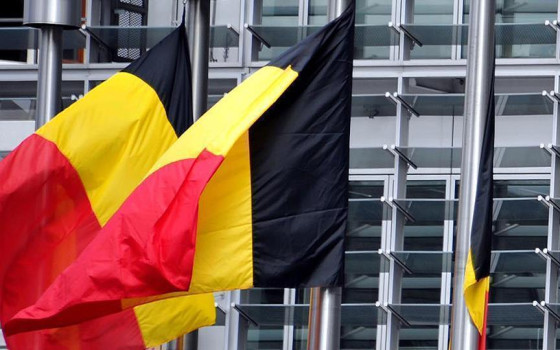
Risk Analysis Center in Belgium: Increased "anti-Semitism" due to the current conflict between Hamas and Israel

- Europe and Arabs
- Monday , 27 November 2023 18:10 PM GMT
Brussels: Europe and the Arabs
The conflict in the Middle East led to more anti-Semitism in Belgium. This has been reported by Ocad, the Center for Risk and Crisis Analysis, and is also evident from the increase in reporting at the Unia Equal Opportunities Centre. "There is tension and a feeling of anxiety."
Since October 7, there has been a clear increase in the number of reports of threats against the Jewish community. “There is increased vigilance among agencies,” says Geert Verkaterin of the Coordination Body for Threat Analysis. “Not all reports of threats are equally serious, but there is tension in the air. There is great concern in the Jewish community.”
The outbreak of conflict arouses strong emotions. “This creates a climate that increases the risk of some people expressing their frustrations in a non-peaceful way. The Israeli-Palestinian conflict is always sensitive. In Belgium there is a large public that is very concerned about this matter.”
Since the beginning of the conflict, there have been approximately seventy threat reports. About half of them are said to be anti-Semitic. Its nature varies widely. This may include verbal intimidation and threats via social media. But there were also some “small-scale incidents.”
For example, a Palestinian man pushed Jewish children in front of their parents. People are also being provoked by driving around the Jewish quarter of Antwerp carrying Palestinian flags. Someone also threw something from the balcony at a Jewish passerby in the street. Last week, there was also serious desecration of Jewish cemeteries in Marsinelle. According to what the Belgian daily newspaper Nieuwsblad reported on its news website
A case has been opened for this matter at the Unia Equal Opportunities Centre, just like the attack on a Jewish couple at Ypres station in early October. Unia registered more than fifty reports related to anti-Semitism, instead of the usual four to five per month. Then it goes beyond just hate speech. “We are very concerned about this,” says Els Kitzmann of Unia. “Although hate speech occurred primarily online until recently, we are seeing an increase in hate speech on the street.”
Political profiling
During Prime Minister Alexander De Croo's visit to Israel, MP Theo Franken (N-VA) raised the Belgian situation on an Israeli TV channel. He told I24: “Our prime minister is in your country to tell you that you are committing war crimes, but he does nothing about the hatred of Jews that we see every day on the streets of Belgium.” “No one has been arrested, and the police are doing nothing.”
De Croo strongly contradicts this. “This is not true. There is always a movement against hatred of Jews,” the Judicial Council confirms. Strict measures against incitement to hatred and anti-Semitism have been imposed since 2013. Since then, the Public Prosecutor’s Office has always had to follow up on reports.
For example, on October 13, a 25-year-old man from Kerbergen was arrested at his home because he made threats against the Jewish community on Telegram. An online statement led to a search of the home. The investigating judge released the man the next day, but imposed a curfew and a comprehensive ban on using the Internet and social media.
There has been an increased threat level to Jewish interests since 2014, at Level 3. The National Crisis Center says additional measures have been taken recently, but should remain in place. Interior Minister Anneliese Verlinde sent additional federal police surveillance patrols to Jewish institutions in Antwerp and Brussels.
Since October 7, Antwerp police have prepared more than 90 reports of hate and discrimination, compared to 167 in all of 2022. Antwerp Mayor Bart de Wever says Antwerp police are working well with the Shemira, the Jewish security service, which receives five times more reports than usual. Justice Minister Paul van Tijschelt visited synagogues in Antwerp last week to hear concerns.
"lack of empathy"
They are already there. There is also growing tension on the Free University ULB campus in Brussels. As UEJB's Gabriel Bjorka said: "There is fear." The ULB Jewish Student Association no longer dares to admit non-members to meetings. “We also no longer wear symbols that show we are Jewish, such as a Jewish necklace or a pendant with the Star of David on it. Since October 7, the atmosphere has become more aggressive. Last week we wanted to sell tickets to our annual party. Some students came demanding, in a very intimidating tone, that we distance ourselves from what is happening in Gaza. We feel that the university has failed us. “Belgium is not doing enough to protect the Jewish community.”
Viviane Teitelbaum, a member of the Brussels Parliament, says this sentiment has widespread support in the Jewish community. He added: "It is wrong to say that Belgium is doing nothing, but it can do more. Europe is asking all member states to present a strategy to combat anti-Semitism. We do not have that. I am concerned about the increase in anti-Semitism. We do not have that. Our politicians are underestimating "The danger of anti-Semitism in our country is underestimated. There is a lack of sympathy for what the Jews are going through now."












No Comments Found